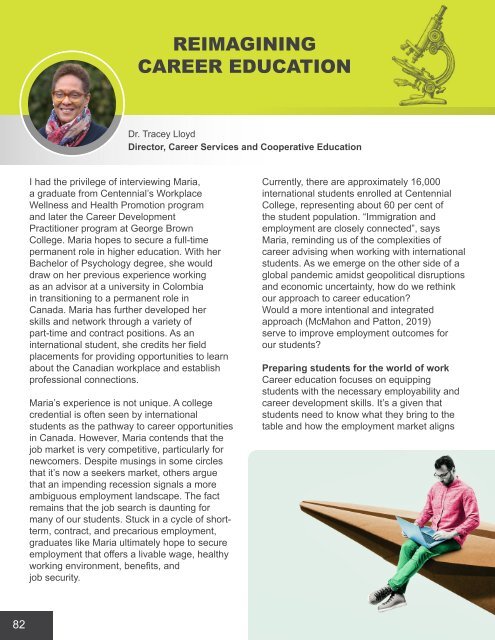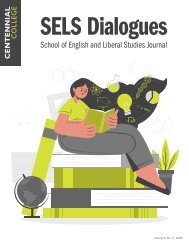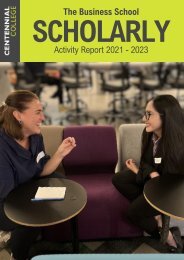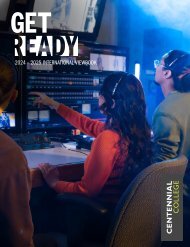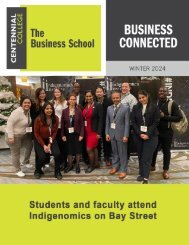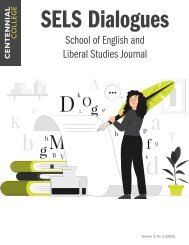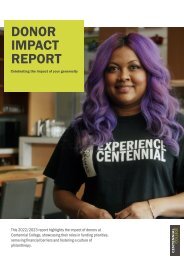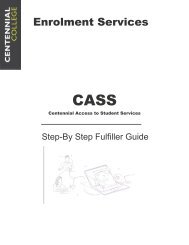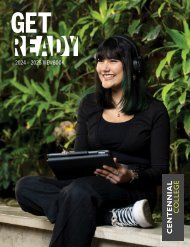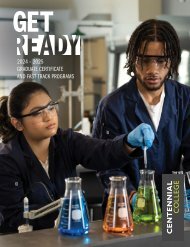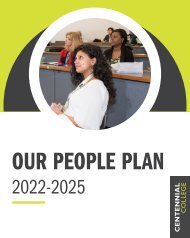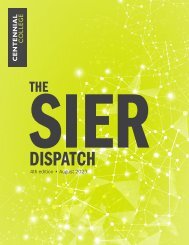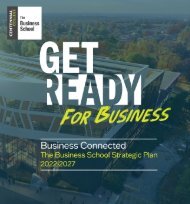The Teaching and Learning Innovation Digest - May 2023
Welcome to a truly special edition of the Teaching and Learning Innovation Digest! Our seventh annual academic publication has assumed an incredibly meaningful shape and form for a number of reasons. Not only did we receive an enthusiastic response with over 30 submissions via our institutional broadcast, but we also have consciously and intentionally embraced the principles of Universal Design for Learning by attempting to represent and celebrate the varied forms of expressions therein. From reflective essays, poetry, visual and performing arts, podcasts, video conversations to scholarly work, academic and applied research, news and updates, and interviews, this is truly a power-packed publication!
Welcome to a truly special edition of the Teaching and Learning Innovation Digest! Our seventh annual academic publication has assumed an incredibly meaningful shape and form for a number of reasons. Not only did we receive an enthusiastic response with over 30 submissions via our institutional broadcast, but we also have consciously and intentionally embraced the principles of Universal Design for Learning by attempting to represent and celebrate the varied forms of expressions therein. From reflective essays, poetry, visual and performing arts, podcasts, video conversations to scholarly work, academic and applied research, news and updates, and interviews, this is truly a power-packed publication!
You also want an ePaper? Increase the reach of your titles
YUMPU automatically turns print PDFs into web optimized ePapers that Google loves.
I had the privilege of interviewing Maria,<br />
a graduate from Centennial’s Workplace<br />
Wellness <strong>and</strong> Health Promotion program<br />
<strong>and</strong> later the Career Development<br />
Practitioner program at George Brown<br />
College. Maria hopes to secure a full-time<br />
permanent role in higher education. With her<br />
Bachelor of Psychology degree, she would<br />
draw on her previous experience working<br />
as an advisor at a university in Colombia<br />
in transitioning to a permanent role in<br />
Canada. Maria has further developed her<br />
skills <strong>and</strong> network through a variety of<br />
part-time <strong>and</strong> contract positions. As an<br />
international student, she credits her field<br />
placements for providing opportunities to learn<br />
about the Canadian workplace <strong>and</strong> establish<br />
professional connections.<br />
Maria’s experience is not unique. A college<br />
credential is often seen by international<br />
students as the pathway to career opportunities<br />
in Canada. However, Maria contends that the<br />
job market is very competitive, particularly for<br />
newcomers. Despite musings in some circles<br />
that it’s now a seekers market, others argue<br />
that an impending recession signals a more<br />
ambiguous employment l<strong>and</strong>scape. <strong>The</strong> fact<br />
remains that the job search is daunting for<br />
many of our students. Stuck in a cycle of shortterm,<br />
contract, <strong>and</strong> precarious employment,<br />
graduates like Maria ultimately hope to secure<br />
employment that offers a livable wage, healthy<br />
working environment, benefits, <strong>and</strong><br />
job security.<br />
REIMAGINING<br />
CAREER EDUCATION<br />
Dr. Tracey Lloyd<br />
Director, Career Services <strong>and</strong> Cooperative Education<br />
Currently, there are approximately 16,000<br />
international students enrolled at Centennial<br />
College, representing about 60 per cent of<br />
the student population. “Immigration <strong>and</strong><br />
employment are closely connected”, says<br />
Maria, reminding us of the complexities of<br />
career advising when working with international<br />
students. As we emerge on the other side of a<br />
global p<strong>and</strong>emic amidst geopolitical disruptions<br />
<strong>and</strong> economic uncertainty, how do we rethink<br />
our approach to career education?<br />
Would a more intentional <strong>and</strong> integrated<br />
approach (McMahon <strong>and</strong> Patton, 2019)<br />
serve to improve employment outcomes for<br />
our students?<br />
Preparing students for the world of work<br />
Career education focuses on equipping<br />
students with the necessary employability <strong>and</strong><br />
career development skills. It’s a given that<br />
students need to know what they bring to the<br />
table <strong>and</strong> how the employment market aligns<br />
with their skillset. <strong>The</strong>y require the necessary<br />
job search tools—a polished resume, interview<br />
skills, <strong>and</strong> a strong online presence. Given that<br />
most jobs are uncovered through leads<br />
in your personal network, students also<br />
benefit from having established professional<br />
connections. Attesting to the power of<br />
networking, Maria shares how she applied for a<br />
job online with no response. She then reached<br />
out to a former professor who connected her to<br />
an employee at that company. Maria followed<br />
up with the contact who later forwarded her<br />
resume to the hiring manager. Maria was<br />
interviewed <strong>and</strong> hired. This shows just how<br />
instrumental professors can be in helping<br />
students access employment opportunities.<br />
Employers identify communication,<br />
collaboration, adaptability, <strong>and</strong> problemsolving<br />
skills, along with an entrepreneurial<br />
mindset, as essential competencies in an everchanging<br />
job market (Social Research <strong>and</strong><br />
Demonstration Corporation, 2021). As students<br />
continue to navigate the employment terrain<br />
<strong>and</strong> build their careers, the ability to leverage<br />
technology, constantly market themselves,<br />
<strong>and</strong> foresee emerging opportunities presents a<br />
competitive advantage.<br />
Technology is even more prevalent in<br />
our work lives today. Remnants of the<br />
p<strong>and</strong>emic era including virtual interviews,<br />
online networking events, <strong>and</strong> remote work<br />
are more commonplace. <strong>The</strong> ubiquity of<br />
applicant tracking systems, AI features in job<br />
search tools, <strong>and</strong> social media marketing<br />
trends require more advanced digital<br />
skills. Strengthening these essential career<br />
skills through intentional learning activities<br />
levels the playing field as students will be<br />
better prepared for the job search process <strong>and</strong><br />
the world of work.<br />
Embedding career skills throughout the<br />
learning journey<br />
Early engagement in career planning <strong>and</strong><br />
job search activities is critical in easing the<br />
transition to meaningful employment.<br />
However, connecting with campus career<br />
services may not be top of mind as students<br />
commence their studies. Students are often<br />
overwhelmed by the transition to college <strong>and</strong><br />
as a newcomer, the adjustment to a new city<br />
<strong>and</strong> culture can be quite challenging, notes<br />
Maria. Some students are balancing school,<br />
work, <strong>and</strong> family commitments. Participation in<br />
co-curricular activities, however valuable,<br />
are not always feasible. Given that the main<br />
connections for students are likely their<br />
professors, how can faculty intentionally weave<br />
important career skills throughout every course<br />
that is part of the academic program?<br />
In addition to the job search tools, career<br />
skills encompass the competencies that<br />
enable students to thrive in the workplace <strong>and</strong><br />
successfully manage their career development<br />
throughout their work lives.<br />
Best practices include:<br />
• Having students conduct virtual <strong>and</strong> inperson<br />
coffee chats <strong>and</strong> informational<br />
interviews with alumni <strong>and</strong> industry<br />
professionals as an assignment.<br />
• Assessing collaboration skills in group<br />
work <strong>and</strong> highlighting the value of<br />
this activity as an essential career<br />
management competence.<br />
82<br />
83


